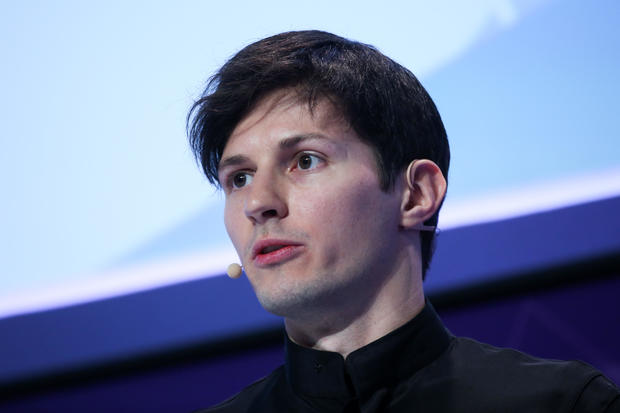
France hands Telegram CEO Pavel Durov preliminary charges over alleged criminal activity on the app
Paris — French authorities handed preliminary charges to Telegram CEO Pavel Durov on Wednesday for allowing alleged criminal activity on his messaging app and barred him from leaving France pending further investigation. Free-speech advocates and authoritarian governments have spoken in Durov’s defense since his weekend arrest, with the chief Kremlin spokesman in Moscow warning Thursday that the case must “not to run into political persecution.”
“We consider him a Russian citizen and as much as possible we will be ready to provide assistance,” Kremlin spokesman Dmitry Peskov told reporters, adding that the Russian government would be “watching what happens next” in the case of the technology entrepreneur. Durov was born in Russia but left the country about a decade ago and now holds citizenship there, as well as in France, the United Arab Emirates and the small Caribbean nation of St. Kitts and Nevis.
The case has called attention to the challenges of policing illegal activity online, and to Durov’s own unusual biography and multiple passports.
Chris Ratcliffe/Bloomberg/Getty
Durov was detained Saturday at Le Bourget airport outside Paris as part of a sweeping investigation opened earlier this year. He was released earlier Wednesday after four days of questioning. Investigative judges filed preliminary charges Wednesday night and ordered him to pay 5 million euros (about $5.5 million) in bail and to report to a police station twice a week, according to a statement from the Paris prosecutor’s office.
making it illegal to iterate or publish virtually any criticism of the Kremlin’s military or the war, which it refers to as a special military operation.
Hundreds of journalists and democracy advocates have fled Russia in recent years, and many others remain imprisoned on charges stemming from the draconian laws curbing free speech in the country. Russia has also detained a number of foreign journalists who have reported on the war, including Wall Street Journal reporter Evan Gershkovich, who was convicted on espionage charges before being freed in a prison swap at the beginning of August. The Journal and the U.S. government always dismissed the charges as baseless.
Putin crackdown widens, Russian-American arrested and charged with treason
04:11
Kremlin spokesman Peskov said he hoped Durov “has all the necessary opportunities for his legal defense,” adding that Moscow stood “ready to provide all necessary assistance and support” to the Telegram CEO but acknowledging the “situation is complicated by the fact that he is also a citizen of France.”
In Iran, where Telegram is widely used despite being officially banned after years of protests challenging the country’s Shiite theocracy, Durov’s arrest drew comments from the Islamic Republic’s supreme leader. Ayatollah Ali Khamenei issued veiled praise for France for being “strict” against those who “violate your governance” of the internet.
French President Emmanuel Macron insisted Monday that Durov’s arrest wasn’t a political move but part of an independent law enforcement investigation. Macron said in post on X that his country “is deeply committed” to freedom of expression, but that “freedoms are upheld within a legal framework, both on social media and in real life, to protect citizens and respect their fundamental rights.”
The history of Telegram and Pavel Durov in Russia
In a statement posted on its platform after Durov’s arrest, Telegram said it abides by EU laws, and its moderation is “within industry standards and constantly improving.”
“Almost a billion users globally use Telegram as means of communication and as a source of vital information. We’re awaiting a prompt resolution of this situation,” it said.
Telegram was founded by Durov and his brother after he himself faced pressure from Russian authorities. In 2013, he sold his stake in VKontakte, a popular Russian social networking site which he had launched in 2006.
The company came under pressure during the Russian government’s crackdown following mass pro-democracy protests that rocked Moscow at the end of 2011 and 2012.
Durov had said authorities demanded the site take down online communities of Russian opposition activists, and later that it hand over personal data of users who took part in the 2013-2014 popular uprising in Ukraine, which eventually ousted a pro-Kremlin president.
Durov said in a recent interview that he had turned down those demands and left the country.
The demonstrations prompted Russian authorities to clamp down on the digital space, and Telegram and its pro-privacy stance had offered a convenient way for Russians to communicate and share news.
Telegram also continues to be a popular source of news in Ukraine, where both media outlets and officials use it to share information on the war and to deliver missile and air raid alerts.
Western governments have often criticized Telegram for a lack of content moderation.
More
Source: cbsnews.com